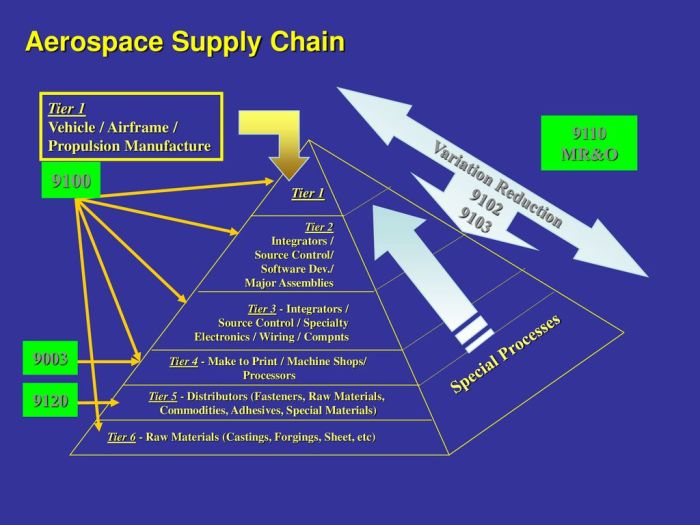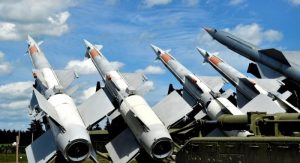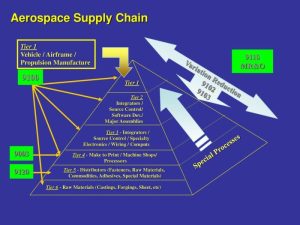
Embark on a thrilling journey through the Aerospace industry supply chain, where challenges are met with innovation and resilience, promising a narrative filled with excitement and insight.
From unraveling the complexities of the supply chain to exploring the latest technological advancements, this topic delves deep into a world where efficiency and sustainability reign supreme.
Overview of Aerospace Industry Supply Chain

The aerospace industry supply chain plays a crucial role in ensuring the smooth operation of the sector. It involves a network of organizations, resources, and activities that are essential for the design, production, and delivery of aerospace products.Key Components:
Suppliers
Provide raw materials, components, and parts needed for aircraft assembly.
Manufacturers
Produce aircraft, engines, and other aerospace products.
Distributors
Handle logistics and transportation of aerospace components.
Maintenance, Repair, and Overhaul (MRO) providers
Ensure the upkeep and repair of aerospace products.Importance of an Efficient Supply Chain:An efficient supply chain in the aerospace industry is vital for cost-effective production, timely delivery, and quality control. It helps in reducing lead times, minimizing inventory costs, and enhancing overall operational efficiency.
Aerospace Industry Supply Chain Challenges
Common Challenges:
- Supply chain disruptions due to geopolitical conflicts, natural disasters, and global pandemics.
- Regulatory compliance requirements impacting procurement and distribution processes.
- Limited visibility and coordination across the supply chain leading to inefficiencies.
Impact of Global Events:Global events such as trade wars, economic downturns, and public health crises can significantly impact the aerospace industry supply chain by disrupting production schedules, causing delays in deliveries, and increasing costs.Strategies to Overcome Disruptions:
- Implementing robust risk management strategies to identify and mitigate potential disruptions.
- Diversifying suppliers and adopting agile supply chain practices to enhance flexibility.
- Leveraging technology such as real-time tracking systems and predictive analytics to improve supply chain visibility.
Technology in Aerospace Supply Chain
Technology Transformation:Advancements in technology are revolutionizing the aerospace industry supply chain by enabling automation, digitization, and data-driven decision-making processes. This leads to enhanced operational efficiency, reduced lead times, and improved collaboration among stakeholders.Role of Automation and Digitization:Automation and digitization play a critical role in optimizing supply chain processes by streamlining production, improving inventory management, and enhancing communication between different supply chain partners.
Robotics, IoT, and AI are increasingly being used to automate manual tasks and increase productivity.Innovative Technologies:Examples of innovative technologies used in the aerospace industry supply chain include RFID tracking systems for inventory management, blockchain for secure data sharing, and 3D printing for rapid prototyping and parts manufacturing.
Sustainability in Aerospace Supply Chain
Importance of Sustainability:Sustainability is gaining importance in the aerospace industry supply chain due to environmental concerns, regulatory requirements, and customer preferences. Companies are increasingly focusing on reducing carbon emissions, minimizing waste, and promoting eco-friendly practices throughout their supply chain.Initiatives for Promoting Sustainability:Companies are adopting sustainable sourcing practices, investing in renewable energy solutions, and collaborating with suppliers to reduce their environmental footprint.
Initiatives such as recycling programs, energy-efficient operations, and green packaging are being implemented to promote sustainability.Impact of Sustainable Practices:Implementing sustainable practices not only helps in reducing environmental impact but also enhances brand reputation, attracts environmentally conscious customers, and ensures long-term viability of the aerospace industry supply chain.
Weight Management Clinic Business Services

A weight management clinic is a specialized healthcare facility that offers services and programs aimed at helping individuals achieve and maintain a healthy weight. These clinics typically provide personalized diet plans, exercise regimens, behavioral therapy, and medical interventions to support individuals in their weight loss or weight maintenance goals.
Target Audience for Weight Management Clinic Services
Weight management clinic services are targeted towards individuals who are looking to lose weight, improve their overall health, manage chronic conditions related to obesity, or simply adopt a healthier lifestyle. The target audience may include individuals struggling with obesity, diabetes, heart disease, or other weight-related health issues.
Benefits of Weight Management Clinic Services for Individuals
- Personalized Approach: Weight management clinics offer personalized plans tailored to individual needs, goals, and health conditions.
- Professional Guidance: Clients receive guidance and support from healthcare professionals, including dietitians, fitness trainers, psychologists, and physicians.
- Behavioral Support: Clinics provide behavioral therapy to address emotional eating, stress management, and other factors that may contribute to weight gain.
- Medical Monitoring: Medical interventions such as medication management and monitoring of health parameters are available to ensure safe and effective weight loss.
- Long-term Success: Weight management clinics focus on sustainable lifestyle changes to help individuals achieve long-term weight management and overall health improvement.
Aerospace and Defense Business Services
Business services in the aerospace and defense sector encompass a wide range of professional services that support the operations, growth, and competitiveness of aerospace and defense companies. These services are essential for ensuring operational efficiency, regulatory compliance, innovation, and strategic decision-making within the industry.
Role of Business Services in Supporting Aerospace and Defense Companies
- Supply Chain Management: Business services help optimize supply chain operations, ensuring timely delivery of components and materials for aircraft and defense systems manufacturing.
- Financial Management: Services such as accounting, budgeting, and financial analysis support companies in managing costs, investments, and financial risks.
- Technology Integration: Business services facilitate the integration of advanced technologies, such as AI, IoT, and cybersecurity solutions, to enhance operational capabilities and cybersecurity defenses.
- Regulatory Compliance: Services assist companies in complying with complex regulatory requirements related to safety, security, export controls, and environmental standards.
Challenges and Opportunities in Providing Business Services to the Aerospace and Defense Industry
- Global Competition: Business service providers face competition from both domestic and international firms, requiring them to offer innovative solutions and expertise to differentiate themselves.
- Sensitive Information: Handling confidential and sensitive information related to defense contracts and technology poses challenges in maintaining security and confidentiality.
- Emerging Technologies: The rapid pace of technological advancements in aerospace and defense presents opportunities for business service providers to offer cutting-edge solutions but also requires continuous learning and adaptation.
- Budget Constraints: Aerospace and defense companies may face budget constraints, impacting their investment in business services, creating a challenge for service providers to offer cost-effective solutions.
Summary
As we conclude this exploration of the Aerospace industry supply chain, we are left with a profound appreciation for the intricate web of processes that drive this industry forward, highlighting the crucial role of adaptability and forward-thinking strategies in overcoming obstacles.
Essential Questionnaire
What are some common challenges faced by the aerospace industry supply chain?
Common challenges include global events impacting logistics, supply chain disruptions, and the need for enhanced efficiency.
How is technology transforming the aerospace industry supply chain?
Technology is revolutionizing the supply chain through automation, digitization, and the integration of innovative solutions like IoT and AI.
Why is sustainability important in the aerospace industry supply chain?
Sustainability is crucial for reducing environmental impact, meeting regulatory requirements, and enhancing long-term business viability.





